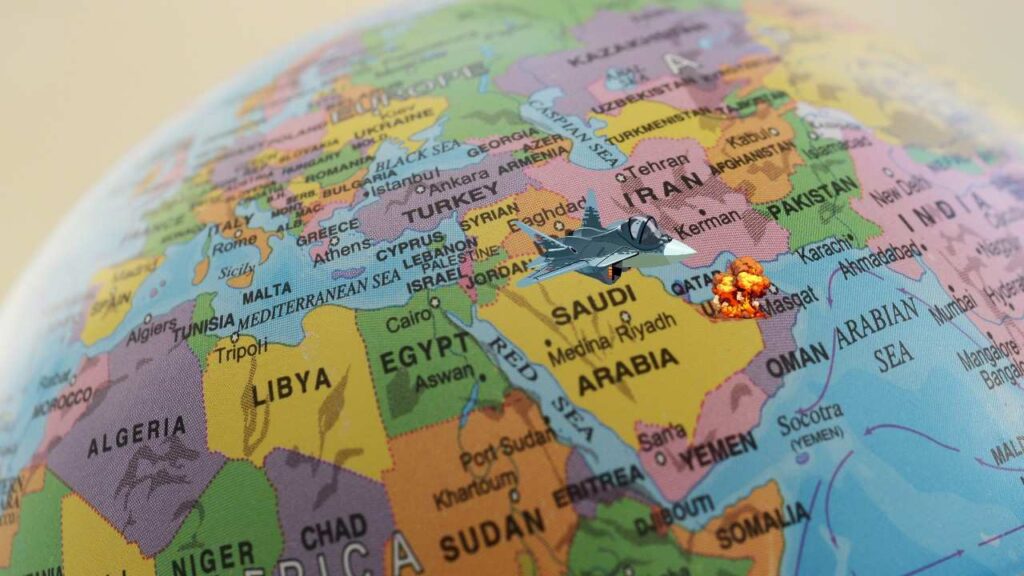
On September 9, 2025, Israel conducted an airstrike in Qatar targeting Hamas leaders during ceasefire talks. Discover the global fallout, impact on Middle East peace, and India’s strategic concerns in this detailed analysis.
On September 9, 2025, the world witnessed a major diplomatic shock when Israel carried out an airstrike in Doha, Qatar. The target of this attack was a meeting of Hamas political leaders who had gathered in Qatar’s capital for ceasefire negotiations related to the Gaza conflict. This aggressive move has not only disrupted peace efforts but also created widespread diplomatic tension globally.
In this blog, we will explain what happened, why Qatar was targeted, the reactions from around the world, how this impacts the Middle East peace process, and what implications it holds for India.
What Exactly Happened?
Yesterday, Israeli fighter jets struck a building in Doha, where several Hamas leaders were meeting to discuss a ceasefire agreement between Israel and Hamas. The meeting was organized as part of a U.S.-led initiative to bring both parties closer to peace after months of conflict in Gaza.
Unfortunately, the attack resulted in the deaths of six individuals:
- A senior Hamas leader’s son
- A Qatari security official
- Four others present at the meeting
While Israel justified the strike as a retaliation for recent attacks on its civilians, the timing and location of the attack raised serious questions internationally. Qatar, traditionally seen as a neutral party and key mediator in Middle East peace talks, was unexpectedly attacked in its capital, an action many are calling a breach of international norms.
Why Was Qatar Targeted?
To understand this, we need to look at Qatar’s unique role in Middle East diplomacy.
Qatar’s Role as Mediator
For many years, Qatar has maintained close relations with various political groups in the region, including Hamas. At the same time, it has acted as a bridge between Hamas and other nations. Qatar hosted several ceasefire talks aimed at ending the long-standing Israel-Hamas conflict in Gaza.
At the time of the attack, Hamas leaders were in Doha to discuss a ceasefire proposal initiated by the United States. The goal was to stop rocket attacks on Israel and curb the Israeli military response in Gaza, offering temporary peace to the region.
Israel’s Stated Reason
Israel’s government claimed the airstrike was a necessary response to recent attacks on Israeli civilians. In particular, a shooting incident at the Ramot Junction near Jerusalem was cited as justification. However, many experts argue that targeting a third country like Qatar, especially during active peace talks, violates international diplomatic protocol.
Global Reactions and Consequences
The attack has triggered strong condemnation and diplomatic fallout across the world.
United States
The U.S. government, while traditionally an ally of Israel, expressed strong disapproval of the attack. President Donald Trump said he was “very unhappy” about the situation, emphasizing that such actions undermine peace efforts. The U.S. pushed for the United Nations Security Council to hold an emergency session, which subsequently condemned the airstrike and called for restraint from all sides.
United Nations
The UN Security Council issued a rare statement that condemned the attack, highlighting Qatar’s sovereignty and the importance of ceasefire negotiations. The statement stressed that attacks on foreign territory are not acceptable under international law, urging Israel to avoid further escalation.
Regional Solidarity with Qatar
Countries like Saudi Arabia and the United Arab Emirates (UAE) voiced strong support for Qatar. They condemned Israel’s action as an “aggression against a sovereign nation” and warned of long-term diplomatic consequences if such actions continued.
Other Global Reactions
Several Western and Arab countries demanded a thorough investigation into the airstrike. Meanwhile, some nations remained neutral but expressed concern about the possibility of escalation in the already volatile Middle East.
Hamas’s Response and Impact on Peace Efforts
Despite the attack, Hamas has made it clear that it remains committed to its demands and will not back down from its position.
Hamas’s Stand
After the strike, a Hamas spokesperson declared that the ceasefire process would continue. Hamas is demanding:
- A full ceasefire agreement
- Withdrawal of Israeli forces from Gaza
- An exchange of prisoners held by Israel for Hamas hostages
This defiant stance suggests that the attack, rather than halting peace efforts, may harden Hamas’s position.
The State of Ceasefire Negotiations
Before the airstrike, the peace talks were seen as the most serious effort in years to reduce hostilities between Israel and Hamas. The involvement of Qatar was viewed as a positive development because of its neutral stance and ability to communicate with both parties.
However, this unexpected attack has cast doubt on the success of negotiations. Qatar’s role as a mediator now appears compromised, as trust between parties diminishes.
What Does This Mean for India?
India has always maintained strong diplomatic relations with the Middle East, not only because of its energy needs but also due to the large Indian diaspora living in Gulf countries.
Impact on Energy Security
Qatar is one of the largest suppliers of Liquefied Natural Gas (LNG) to India. Any instability in Qatar could impact LNG supplies, potentially increasing energy costs in India.
Diplomatic Balance
India has traditionally maintained a balanced approach in the Israel-Palestine conflict, encouraging peaceful dialogue and regional stability. In the current situation, India may face pressure to respond carefully, balancing its relations with Israel, Qatar, and other Gulf nations.
The Humanitarian Angle
India also has a large number of Indian workers living in the Gulf. Any further escalation of violence could endanger their safety and impact remittances sent back home.
What Lies Ahead?
The Israel-Qatar airstrike incident is not just a momentary flashpoint; it could have far-reaching consequences for regional peace and global diplomacy.
Risk of Escalation
There are real fears that this attack could lead to a wider conflict. If Hamas chooses to retaliate, or if Israel conducts further strikes, the cycle of violence will intensify.
The Future of Mediation
International bodies like the United Nations and major powers such as the United States, Saudi Arabia, and UAE will have to work harder to rebuild trust and bring parties back to the negotiation table.
India’s Role
India should focus on promoting peaceful dialogue and work through diplomatic channels to support mediation efforts. With its growing influence on the global stage, India can play a constructive role in maintaining peace.
⚠️ Disclaimer
This article is based on publicly available news sources and reflects personal opinion. It is not affiliated with any individual or organization mentioned. The situation is evolving, and readers are encouraged to follow credible news sources for the latest updates.
Some Useful links – Red Sea Crisis 2025: How Rising Shipping Costs Are Impacting India’s Economy






Leave a Reply